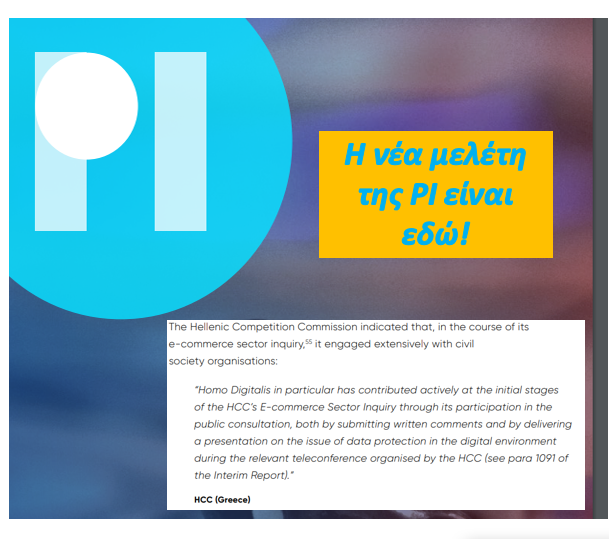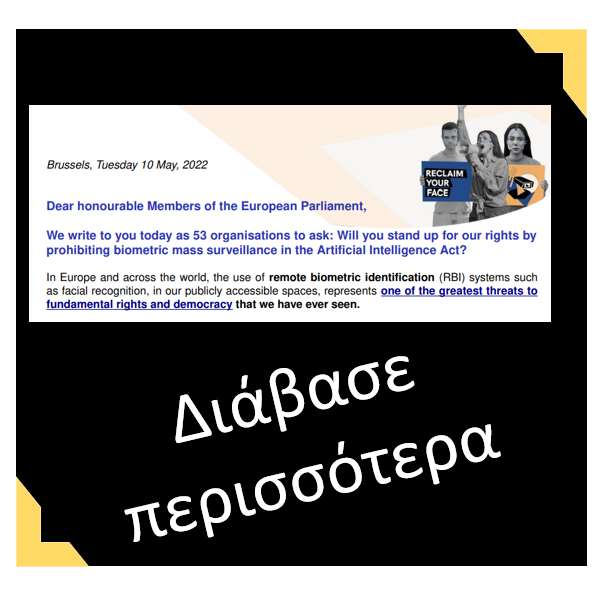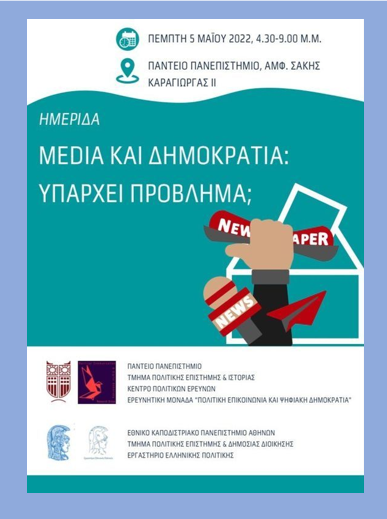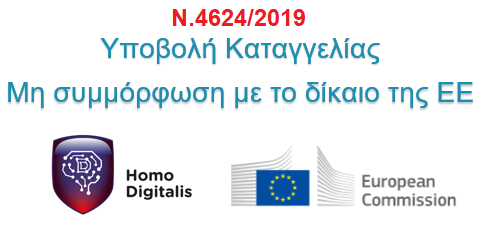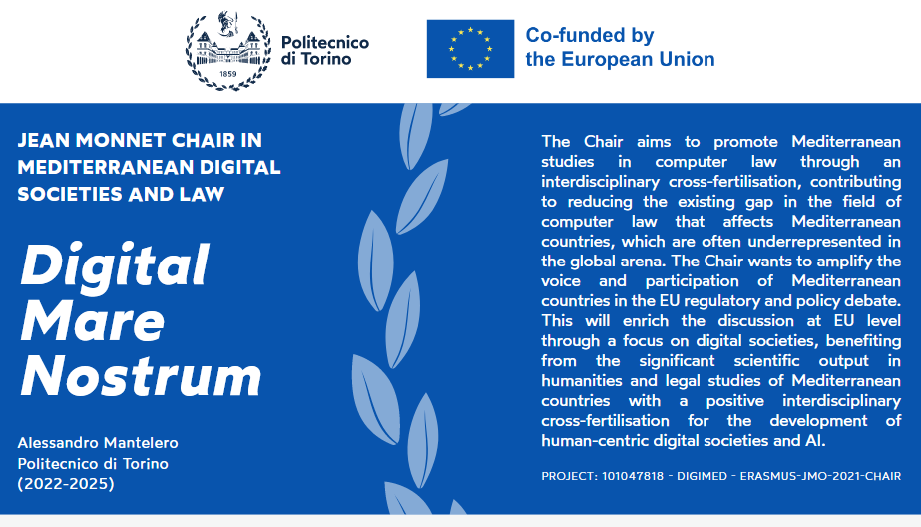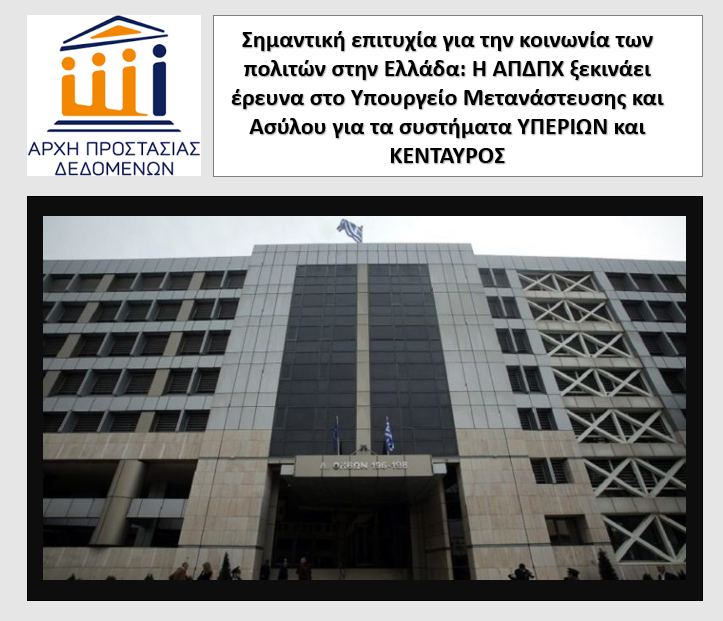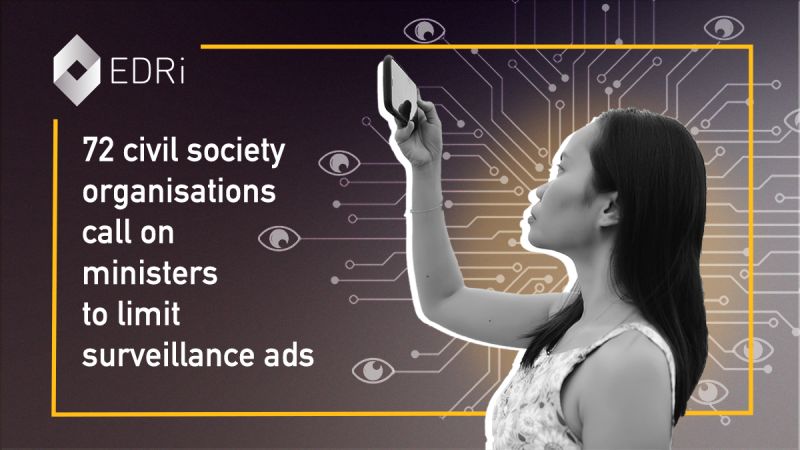Privacy International's new study on competition and personal data published
Privacy International today published its new comprehensive study on the interplay between personal data and competition law. The study features statements from national competition commissions and civil society organisations, and explores the relationship of cooperation between these bodies and its importance for properly addressing the human rights challenges posed by the commercial practices of large technology companies.
It is a great pleasure for Homo Digitalis to have been selected by the Privacy International team to participate in the study with statements, and of course it is a great honour to be mentioned by the Hellenic Competition Commission for our actions and their contribution to promoting dialogue in this area.
You can read Privacy International’s study here.
We call on the European Parliament to support a ban on biometric surveillance technologies
Today, 53 civil society organisations, including Homo Digitalis, sent an open letter to the European Parliament calling on its members to support the ban on mass biometric surveillance technologies in the provisions of the proposed legislation on the use of AI.
The action is part of the Reclaim Your Face campaign and aims to raise awareness among MEPs of the risks to democracy and human rights posed by the use of these technologies, and to ask them for their practical support for a ban on their use in the EU legislative process.
You can read the open letter here.
Homo Digitalis at a conference at Panteion University
On Thursday 5 May, our member Alkmini Gianni will represent us at the conference on ‘Media and Democracy: Is there a problem?’ on Thursday 05 May at the Sakis Karagiorgas II Amphitheatre (New Panteion Building on the pedestrian street Al. Pantou – second floor).
The Speakers will analyse the relationship between Civil Society and misinformation and #fakenews on the internet! The CP will be represented by Homo Digitalis, Hellenic Hoaxes and VouliWatch.
The conference is organized in partnership with Panteion University and the National Kapodistrian University of Athens. No pre-registration is required for participation in the conference! We are waiting for you to discuss together about the challenges that arise!
The 5th episode of the #supercyberkids series is here
How many times have you connected to the WiFi of a café, a hotel or a free WiFI?
In the fifth video in our #supercyberkids series, we highlight the risk of leaking our personal data and passwords when we connect to third-party WiFi networks. We only connect to password-protected WiFi networks and double-check the name of the WiFi network before connecting!
The #supercyberkids episode series is produced by ICSI HELLAS S.A., (ISC)2 Hellenic Chapter, and Homo Digitalis
You can watch all episodes, completely free of charge, on our YouTube channel
Homo Digitalis participates in GIG-ARTS 2022
Homo Digitalis has the great honor and pleasure to be present at the prestigious GIG-ARTS conference taking place on April 13-14 in Cyprus.
Specifically, on Thursday, April 14, Homo Digitalis Vice President and co-founder Stefanos Vitoratos will speak on the impact of the pandemic on digital life together with Professor Despina Anagnostopoulou and the Commissioner for Personal Data Protection of Cyprus, Mrs. Irene Loizidou Nikolaidou.
On the same day, our regular member Alexandra Giannopoulou will present at the conference the study that she and our regular member Ioannis Krontiris have co-authored on digital identities and the challenges posed by the Self-Sovereign Identity (SSI) model.
You can see the conference programme here.
You can read more about digital identities and the decentralized digital identity model in a related article by Ioannis Krontiris for our website here.
Great success of Homo Digitalis! The European Commission warns Greece about 4624/2019
Another great success of Homo Digitalis!
Following the complaint we had filed before the European Commission in October 2019 and the thorough investigation of the provisions of Law 4624/2019 by the latter, the European Commission decided to send a letter of warning to Greece for not having correctly transposed into national law the provisions concerning, among others, the scope of Directive 2016/680 on law enforcement and the time limits for data storage.
Our country now has two months to respond and take the necessary measures to remedy the breach of EU law found by the Commission. Otherwise, the Commission may decide to send a reasoned opinion.
You can read the European Commission’s Communication here.
Homo Digitalis on the Advisory Committee of the new Jean Monnet Chair in Mediterranean Digital Societies & Law
It is a great honour and pleasure for Homo Digitalis to be a member of the Advisory Committee of the new Jean Monnet Chair in Mediterranean Digital Societies & Law, Professor Alessandro Mantelero of Politecnico di Torino.
The aim of this chair is to promote Mediterranean studies in computer law through interdisciplinarity, contributing to reduce the existing gap in the field of computer law that affects Mediterranean countries, which are often underrepresented in the global arena. The Chair wishes to strengthen the voice and participation of Mediterranean stakeholders in the debate on EU legislation and policy and the development of human-centred digital societies by harnessing the benefits of artificial intelligence.
Homo Digitalis will be represented by the Secretary of the Board of Directors, Eleftherios Chelioudakis, who will deliver the keynote speech at the opening seminar on 5 April.
You can see the full programme of the seminar in the event poster and watch the seminar at this link on the day of the event.
A major success for civil society in Greece: The Hellenic DPA launches an investigation into the Ministry of Immigration and Asylum re the YPERION and KENTAYROS IT systems
On Wednesday 2 March, the Hellenic Data Protection Authority (DPA) launched an investigation into the Ministry of Immigration and Asylum regarding the supply and installation of the YPERION and KENTAYROS systems in reception and accommodation facilities for asylum seekers.
Specifically, following the successful submission of a request submitted on 18 February by the organisations (in alphabetical order) Hellenic League for Human Rights, HIAS Greece, and Homo Digitalis together with the Lecturer of Queen Mary University of London Dr. Niovi Vavoula before the President of the Hellenic DPA, the Authority addressed a communication to the Ministry of Immigration and Asylum inviting it to inform it immediately about:
– the specific legal basis for the processing of personal data in the context of the operation of YPERION and KENTAYROS systems; and
– the carrying out of an impact assessment study on the impact of the processing on the protection of personal data, taking into account that in the case of the procurement of surveillance and monitoring systems, the carrying out of an impact assessment regarding their operation must be carried out not only before their operation, but also before their procurement, in order to comply with the principles of data protection by design and by default.
As the DPA states, together with the request for investigation we had filed, they had also received a request for information from the European Parliament’s Civil Liberties, Justice and Home Affairs Committee (LIBE Committee) on the surveillance technologies generally used at our country’s borders.
We recall that the YPERION system will be the asylum seeker management system with regard to all the needs of the Reception and Identification Service and will be responsible for access control (entry – exit via security turnstiles), by showing an individual card of a migrant, NGO member, worker and simultaneous use of fingerprints), the monitoring of benefits per asylum seeker using an individual card (food, clothing supplies, etc.) and the movements between the centres, KIDNs and Accommodation Facilities. The KENTAYROS system will be the digital system for managing electronic and physical security around and inside the facilities, using cameras and Artificial Intelligence Behavioral Analytics algorithms.
You can read the relevant letter sent by the DPA to the Ministry of Immigration and Asylum here.
You can read more about the joint request for research filed in February here.
ΕDRi and other 70 CSOs call EU Member States to take the right approach during DSA trilogue
Ahead of the #DigitalServicesAct negotiations, EDRi, Amnesty International, Civil Liberties Union for Europe and 69 civil society organisations call on 20 ministries and state secretaries in the Netherlands, Denmark, Germany, France, Spain, Italy, Luxembourg, Austria, Croatia to BAN #DarkPatterns and pervasive online tracking practices and preserve privacy.
If done right, the #DSA can ensure that you are part of a rights-respecting online environment, in which you have the power to make truly informed choices and where the online advertising industry respects your rights and freedoms.
During the ongoing Trilogue negotiations, we urge the Member States to defend people and push against toxic #BigTech business models. .
You can read our joint letter here.
